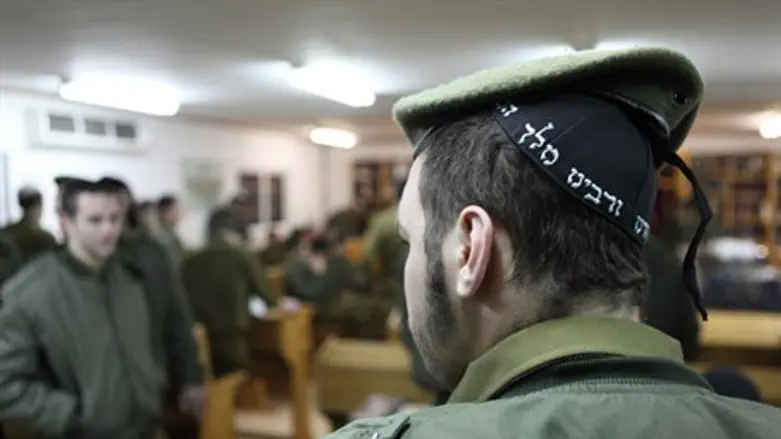
In recent months, the IDF has confirmed that officers and soldiers living in hareidi neighborhoods - many of them themselves hareidim - have been subject to physical and verbal abuse. Now, a special committee has formed to address the problem.
Beit Shemesh, some neighborhoods of which have become hotbeds of hareidi extremism, presents a particular problem for the religious-Zionist community, which has been faced incitement from some quarters which has on occasion spilled into violence.
In the latest such episode, on Sunday Walla! News learned that soldiers from the city, which lies some 30 kilometers west of Jerusalem, have been given permission to change into civilian clothing before returning home from their bases, to prevent them from suffering from unwarranted abuse.
"I leave the base in uniform, then change into civilian clothes at the Central Bus Station before going home," Y., a combat officer, explained to the daily. Y. lamented the "group of fanatics who lives in our city and is responsible for all this mess - not only in terms of our own safety but also spitting on women, separate busses and fights with the Israel Antiquities Authority."
He stressed that most IDF soldiers from Beit Shemesh live in peace with the hareidi community at large, even if many of the latter are fundamentally opposed to IDF service.
"All this tension began about a year ago, when the issue of the hareidi draft was raised," Y continued. "The hareidi community feels that their way of life has been threatened, and some of them began to attack IDF soldiers in uniform - especially those who looked nervous - in places like Mea Shearim in Jerusalem."
"The phenomenon trickled down here, but [attacks] never quite reached those levels," he added.
Y stated that while Beit Shemesh's fanatics shout curses at the soldiers, there has been no physical violence - so far.
"They mainly spit curses at us, like 'hardak' [pejorative combination of words for 'vermin' and 'hareidi' - ed.], or spit at us," he said. "I've never met someone who has been the victim of physical violence, like what happens in Mea Shearim, but none of us want to see if it can get there."
"Overall, the fanatics all live in the same neighborhood," he reflected. "I realized that wearing olive green [fatigues], especially in combination with a [stereotypically hareidi] black yarmulke, is a red flag for them, so it's better to take them off."
Hareidi abuse is not confined to their own neighborhoods, however. A., a religious soldier from Beit Shemesh, told of experiencing physical assaults in some cases.
"Sometimes they push you suddenly or block you from getting on the bus, claiming they are unwilling to sit next to 'hardakim' - it happened to a friend of mine," he said. "But there were no physical blows."
M., also a national-religious combat soldier, decided not to wait until he personally experienced the abuse. He submitted a request immediately to be able to return home in civilian clothing.
"The atmosphere [against IDF and the national-religious] on the street has not changed, and there is a sense that they are chasing after us," M. said. "We found out that there was a campaign launched against us and that the person who distributed fliers against us nationwide lives here in Beit Shemesh."
"I saw them look at me, I heard about my friends being attacked, and there is a real sense of tension in the air," he continued. "I did not wait to experience this for myself."
The soldiers noted that while they bear their guns with them as they go home - such is official IDF policy - the lack of a uniform still gives them a measure of protection.
"They see the gun and recognize that we're soldiers, but it's not the same," Y. said. "Going home in uniform is like poking their eyes out with it, the same as a woman walking in the neighborhood wearing anything less but their standards of modesty."
Y continued that local soldiers in the hareidi side of Beit Shemesh have tried to appeal directly to the Rabbis of their attackers.
"We tried - and not just me, but many many people tried - and it just looks like [the Rabbis] don't have control over them," Y lamented.
He did give the Rabbis benefit of the doubt, despite his hardships. "I don't believe the Rabbis encourage this behavior, as fanatical as they are."
Y also said that the hareidi community's actions have hurt him deeply.
"You go out and defend the country, give of yourself, put yourself in danger and then you have to take off your uniform and sneak home, ashamed, so no one will see who you really are," Y said. "It's like I'm returning home to [Palestinian Authority city] Jenin. This is a disgrace to the State of Israel and a disgrace to us as a society."